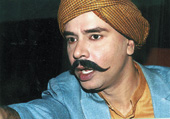 |
| Goutam Halder plays dual roles in Barda. Picture by Sanjoy Chattopadhyaya |
Why enact stories nearly a hundred years old? And if enacted, what variations in form and content do they call for? These questions surfaced during the four-day theatre festival held at Bharatiyam from October 1. This was the second event of a yearlong celebration to mark the 125th birth anniversary of writer Munshi Premchand, organised by the cultural ministry.
?Premchand wrote about injustice in every form. And as long as injustice is rampant, his works will continue to be relevant,? said Delhi-based director Rajendranath whose troupe Abhiyan presented the opening play, Premchand. The production wove together three semi-autobiographical works, which had never been presented on stage. ?The pieces ? Muktidaan, Pandit Moteram Shastri and Sadgati ? represent three stages of Premchand?s career. His early childhood to his first job, his first writing and his first printed work? they also represent the wide range of rasas his works encapsulate,? Rajendranath added.
Day II saw two more works by Premchand on stage, Sava Ser Gehun and Mandir Masjid, directed by Motilal Gupta of Prem Kala Manch, Varanasi. Neelkantha Sengupta?s group presented Dansagar, based on Premchand?s Kafan, on the third day. This was followed by an experimental treatment of Bade Bhai Saheb by Nandikar.
The play has seen several past productions, including one by Naseeruddin Shah?s Motley. But Nandikar?s Bengali version, Barda, challenged viewers with its liberal use of video projection. The first-person narration in the original story was presented as an interview for the electronic media. Goutam Haldar (he plays both the younger and elder brothers) mostly faces the cameraman in the wings, but thanks to a projector his expressions and movements were amply displayed on a background screen.
?The speaker could be Premchand who would have been a celebrity if he was still alive, we copied his appearance from an old photograph. This was an attempt to see how close theatre can be taken to cinema,? said Haldar. Public response was understandably mixed.
The same play presented by Jan Natya Manch on the final day was a totally different experience. ?We picked up Bade Bhai Saheb as a reaction against the decision to remove Premchand?s novel, Nirmala, from the CBSE syllabus. We began with two actors just reading out the story from books. Then as we memorised the lines, the books were cast aside and we unconsciously began to use facial and body language. It still is little more than a reading. We can play it anywhere, in schools, college canteens, the roadside?,? said actor-director Sudhanva Deshpande.
The final day also featured Rangakarmi?s Maiyyat, staged after a very long gap. ?Though based on a script by Vijay Dalvi, it echoes Premchand?s feeling for the oppressed dalits. I intend to try a series on Premchand who has always been my favourite writer,? said director Usha Ganguli. Clever choreography, costumes and songs made the play a treat to watch.
Lady M in Kerala
 |
Crossings, a dance theatre production by Calcutta-based Ranan, is travelling to Kerala for the International Shakespeare Theatre Festival, from October 12 to 16.
The festival has been organised by Natyasastra, a theatre group and centre for theatre studies based at Katampazhipuram in Kerala, to mark its 10th anniversary. The gala involves groups from various parts of India and renowned director Maya Tangburg?s production of A Midsummer Night?s Dream. The intention is to highlight the contemporary relevance of Shakespeare?s plays. Films on the bard?s plays will also be screened.
Directed by Vikram Iyengar of Ranan, Crossings explores the various shades of Lady Macbeth. The play had earlier been staged in London and Wales. The Crossings cast includes kathak dancer Debashree Bhattacharya, Manipuri dancer Suman Sarawgi, Bharatnatyam dancer Archana Ramaswamy and actress Anubha Fatehpuria. The music is composed and rendered by Nageen Tanvir with percussion by Siddhartha Bhattacharyya.










